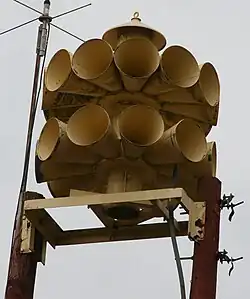
The Federal Signal 3T22 / 2T22 was a dual tone, mechanical outdoor warning siren made by Federal Signal Corporation (formerly Federal Sign and Signal Corporation) from 1952 through the early 1990s. It has a very recognizable design, having a ten-port rotor (chopper) on the bottom with ten cones (horns) and a 12-port one on top with twelve cones.
History
The Federal Signal 3T22 was originally designed as the 2T22 in 1952 or 1954. The 2T22 had the same number of ports and cones. It could produce two main signals (it could produce more but the other signals were rarely used), hence the name "2T22" (the 2 at front representing the 2 choppers, and the 22 representing the amount of horns). The siren had no solenoids, so it could not perform a "hi-lo" signal. In 1955, Federal designed the 3T22, which was similar, except for its name and that it had solenoids. The 3T22 was superior in design because it could perform the "hi-lo" signal, which is mainly used for fire calls. The 2T22 and 3T22 could produce 113db (measured 100 feet away from the siren). There are four models of this type of siren. the 2T22 A and B and the 3T22 A and B. In the name 3T22, the 3 stands for its three main signals: attack (wail), alert (steady), and hi-lo, and the 22 again stands for the twenty-two cones. The A or B determined whether the motor was three phase or single phase. A 3T22A would be three phase, while a 3T22B would be single phase. The siren was mainly used for air raid warnings during the Cold War era and weather warnings after the war. In the early 1990s, the siren's production was stopped when it was replaced with the newer 2001-SRN, which could reach 126db (also measured 100 feet away), hence the name. Like many other older siren models, these sirens are becoming more uncommon due to their age and because of newer technology.
Design
The 3T22 came in only one port ratio: 10/12. It had ten ports and cones on the bottom and twelve ports and cones on the top. It also had a smaller cone on top to reduce rain and other water-related substances such as snow from getting inside. It had two solenoid boxes, one on top, and one on the bottom. There were also two air intake spots: also one on the top and bottom. The siren had a small stand with three legs so it could be mounted on a pole or roof. The stand could be removed and the siren could be mounted differently.
References
http://civildefensemuseum.com/sirens/manuals/255A152H-2T22-3T22.pdf